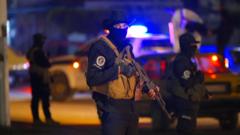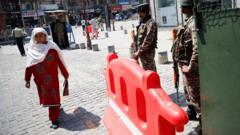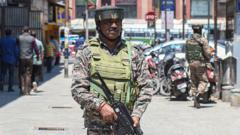In a significant moment for Syria, President Ahmed al-Shara arrived in France on May 7, 2025, marking his first official visit to a European nation since taking office. This journey reflects his intent to re-establish Syria's place in the global community, although the country continues to wrestle with the aftermath of a lengthy civil war and ongoing sectarian violence.
Syria's President Ahmed al-Shara Engages with France Amid Ongoing Turmoil

Syria's President Ahmed al-Shara Engages with France Amid Ongoing Turmoil
Ahmed al-Shara's historic visit to France signals a shift in Syria's international relations despite persistent domestic challenges.
During his visit, al-Shara engaged in discussions with French President Emmanuel Macron at the Élysée Palace. The agenda included Syria's political transition, security concerns, anti-terrorism measures, economic support, and enhancing regional stability. Macron, expressing his apprehension regarding persistent sectarian strife, urged al-Shara to remain committed to transforming Syria into a "free, sovereign, and pluralist" nation.
Despite these diplomatic endeavors, al-Shara faces skepticism from both domestic and international observers, particularly due to his leadership background with an Islamist rebel faction previously linked to Al-Qaeda. His status as a sanctioned individual under counter-terrorism measures necessitated that he obtain a special waiver from the United Nations for this trip. This backdrop has prompted criticism from some factions in France, where recent history has been marked by a series of Islamist attacks.
Jean-Noël Barrot, France’s foreign minister, articulated the cautious approach the French government is taking with al-Shara by emphasizing their commitment to evaluating future actions rather than offering unconditional support.
As Syria grapples with the enduring challenges of violence and instability, al-Shara’s European visit embodies both hope and apprehension regarding the nation's journey towards recovery and acceptance on the world stage.
Despite these diplomatic endeavors, al-Shara faces skepticism from both domestic and international observers, particularly due to his leadership background with an Islamist rebel faction previously linked to Al-Qaeda. His status as a sanctioned individual under counter-terrorism measures necessitated that he obtain a special waiver from the United Nations for this trip. This backdrop has prompted criticism from some factions in France, where recent history has been marked by a series of Islamist attacks.
Jean-Noël Barrot, France’s foreign minister, articulated the cautious approach the French government is taking with al-Shara by emphasizing their commitment to evaluating future actions rather than offering unconditional support.
As Syria grapples with the enduring challenges of violence and instability, al-Shara’s European visit embodies both hope and apprehension regarding the nation's journey towards recovery and acceptance on the world stage.




















